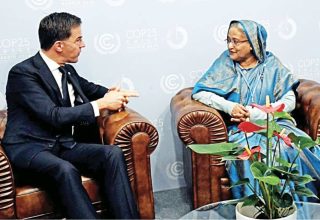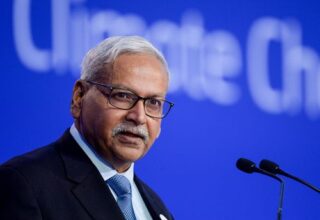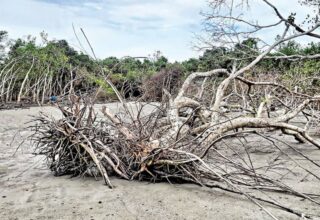
It has now been well over five years since the Green Climate Fund (GCF) was set up with its headquarters in Songdo, Korea to support both mitigation and adaptation projects and programmes in developing countries. It received an initial contribution of around USD 10 billion and is now undergoing a review of its performance in anticipation of a major replenishment of funds from 2020 onwards.
I would like to shed light on its performance as seen from the Bangladesh perspective and from that of the most vulnerable countries and communities who should be the priority when it comes to adaptation funding.
The Board of the GCF took a laudable decision to allocate half their funds to adaptation and half to mitigation and also to prioritise the most vulnerable countries. However, in its performance over the last few years, it has been unable to deliver on that promise effectively.
I would like to talk about some of the problems and offer suggestions for improvement in future. Needless to say, these are my personal views only.
The first problem is that they recruited people with background in banking rather than fund management. Bankers are hardwired to give loans and seek return on their loans. This works well for mitigation projects where there is an income stream from the project which allows for a return on the investment.
However, it does not work for adaptation, especially when the recipients are the poorest and most vulnerable communities. These funds need to be given as grants and the funder needs to seek out the most vulnerable communities and not simply sit in Songdo and expect full-fledged projects to come to them.
This attitude and lack of clear guidance from the GCF on how to prepare and submit adaptation projects led to two cases (one from Bangladesh and one from Ethiopia) which went all the way up to the Board where they were finally rejected. These two failures should be seen as case studies of how not to do things in future.
The recent appointment of Mr Yannick Glemarec as the new CEO of the GCF who has a background in fund management and development gives us some hope that a paradigm shift may now be possible.
A second complaint from Bangladesh as well as many other least developed countries (LDCs) is regarding the inordinately complicated procedures that the GCF requires to get accreditation to apply for funding. In the case of Bangladesh, for example, the government initially identified six public sector entities to apply for GCF accreditation and, of them, only two (PKSF and IDCOL) managed to get accreditation after more than two years of back and forth with the GCF.
Now, the private sector window of the GCF has been opened up for Bangladeshi companies and NGOs to apply for accreditation but unless the GCF’s procedures are made easier, it will be a futile exercise for most of the applicants.
With regards to the overall allocation of half the funds for adaptation and half for mitigation, the GCF has only achieved a third for adaptation alone and fudged their numbers by counting around a third of their portfolio as both adaptation and mitigation. Also, the adaptation projects they have approved have not really been able to reach the most vulnerable communities.
At the recent 13th International Conference on Community-Based Adaptation (CBA13) held in Addis Ababa, Ethiopia, there was a clear call for enhanced funding from rich countries to support adaptation in the most vulnerable countries and communities. But at the same time, there was strong criticism of the current intermediaries (especially the GCF) for their failure to actually deliver effectively whatever funds were available.
Hence if the GCF is to make a case to its donors in order to receive substantially more funds after 2020, the case should be strong—one that accepts their failure in the past and shows how they will improve in future. The recently produced paper on adaptation by the GCF is a step in the right direction but the proof of the pudding will be in the eating.
Finally, the one mandate that the GCF has to support transformation rather than merely business-as-usual, is perhaps where the performance has been the poorest.
This is because the modalities that they have of depending on countries bringing in projects for funding over a few years only are inimical to doing anything transformational as that requires a longer term investment.
Hence my advice to the GCF management and board would be to allocate a certain percentage of their funds to proactively seek out opportunities in longer term genuinely transformational investments. It also means that the GCF needs to practise its creed of being a “learning organization” more effectively by engaging with the research and academic worlds working on adaptation.
I have two suggestions for delivering on this aspect of their work. The first is to partner with Bangladesh, not just as a recipient of funds, but also as a learning partner from whom GCF can learn (and then share that learning with other countries) about how the country is taking a path of transformation from being one of the most vulnerable countries to one of the world’s most resilient countries by 2030.
The second suggestion is for GCF to routinely link up with universities in each of the countries receiving funds for adaptation to enable the in-country university to become the locus of training, capacity building as well as knowledge generation and sharing, and even for longer term, post-project monitoring of the outcomes of the investment long after the project is over.
The recently set up LDC Universities Consortium on Climate Change (LUCCC) would be happy to provide in-country partnership in every LDC receiving adaptation funding from the GCF.
Originally this article was published on April 24, 2019 at Daily Star. The author Dr. Saleemul Huq is the director of the International Centre for Climate Change and Development (ICCCAD) at the Independent University, Bangladesh (IUB).
Email: saleemul.huq@icccad.net






